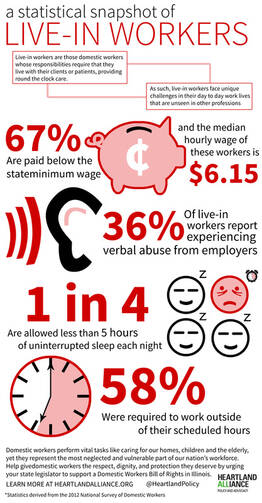Some of the most basic labor protections in American life – the minimum wage and overtime pay – were established in 1938 when Congress passed the Fair Labor Standards Act. But contrary to popular belief, Congress excluded certain categories of workers from coverage. Among these were domestic workers: housekeepers, maids and childcare workers who work (and sometimes live) in the homes of their employers.
Typically immigrant women, these workers occupy a central role in an economy increasingly organized around two-income families. All too often, however, they work grueling hours for low pay, without sick leave or personal time to tend to their own needs and those of their own families.
That’s why I was so happy to receive a note from ARISE, a Chicago-area interfaith worker advocacy group, announcing that the Illinois house had passed a Domestic Workers’ Bill of Rights. The law requires employers of domestic help to create a basic written contract laying out the worker’s duties, pay and schedule; pay the minimum wage (and time-and-a-half after 40 hours); and permit the employee a meal break if working a full day.
The National Domestic Workers Alliance has been campaigning for such laws across America for years. If approved by the Senate and signed by the Governor, Illinois will join New York, Hawaii, California and Massachusetts in the ranks of states that have extended these critical labor protections to some of our most vulnerable workers.








